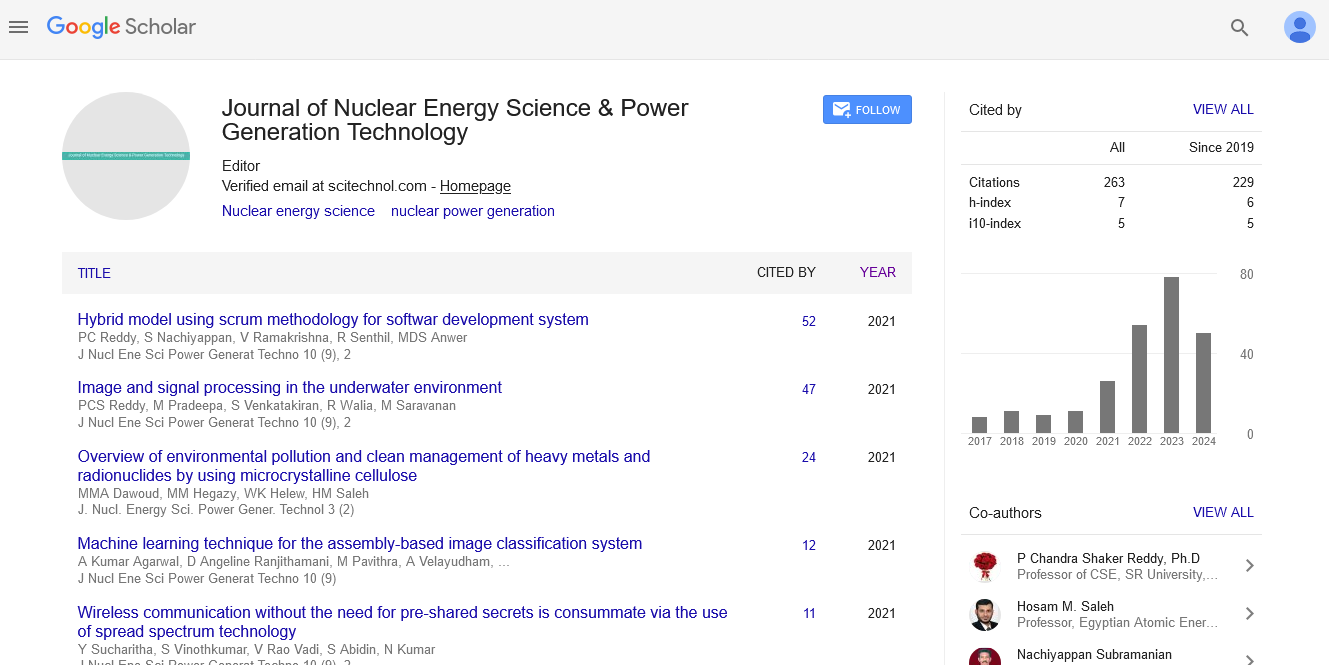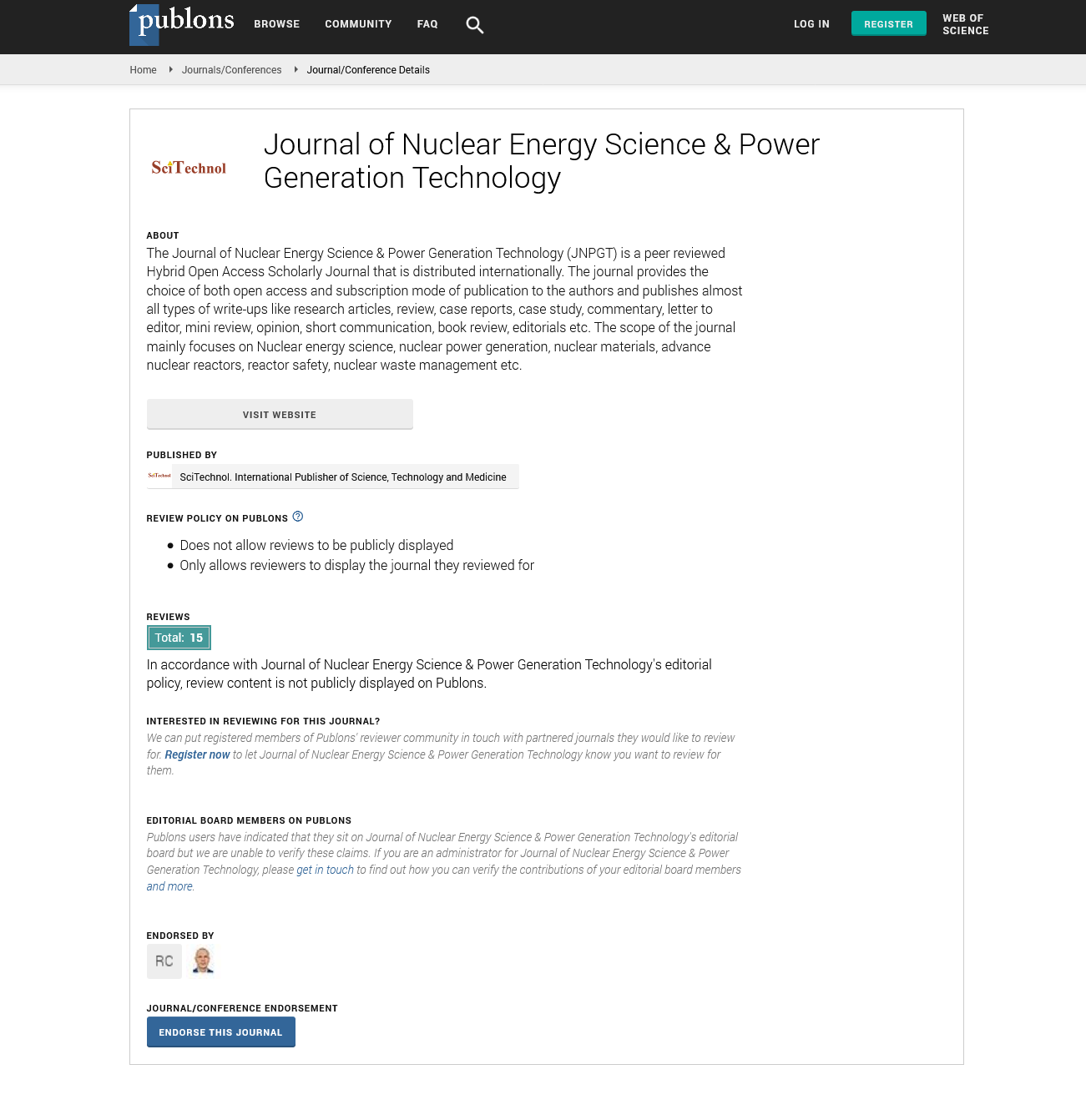Opinion Article, J Nucl Ene Sci Power Generat Technol Vol: 13 Issue: 5
Role of Nuclear Energy in a Sustainable Future
Ferinsa Hein*
1Department of Mechanical Engineering, Eindhoven University of Technology, Eindhoven, The Netherlands
*Corresponding Author: Ferinsa Hein,
Department of Mechanical Engineering,
Eindhoven University of Technology, Eindhoven, The Netherlands
E-mail: ferinsa_hein@gmail.com
Received date: 26 August, 2024, Manuscript No. JNPGT-24-150413;
Editor assigned date: 28 August, 2024, PreQC No. JNPGT-24-150413 (PQ);
Reviewed date: 11 September, 2024, QC No. JNPGT-24-150413;
Revised date: 18 September, 2024, Manuscript No. JNPGT-24-150413 (R);
Published date: 25 September, 2024, DOI: 10.4172/2325-9809.1000416.
Citation: Hein F (2024) Role of Nuclear Energy in a Sustainable Future. J Nucl Ene Sci Power Generat Technol 13:5.
Description
The important need to transition to cleaner energy sources to moderate climate change, nuclear energy has reemerged as an essential component of the conversation on sustainability. With growing concerns over carbon emissions from fossil fuels, nuclear power offers a reliable, low-carbon energy source that can help bridge the gap between current energy demands and the need for a sustainable future. One of the key arguments for the inclusion of nuclear energy in the sustainable energy mix is its low carbon footprint. Nuclear power plants generate electricity through nuclear fission a process in which uranium atoms are split to release energy. Unlike coal, oil or natural gas this process produces negligible amounts of carbon dioxide during operation which makes nuclear energy one of the cleanest sources of large-scale electricity generation. In addition to being low-carbon, nuclear energy is also highly efficient.
A single uranium fuel pellet roughly the size of a pencil eraser can produce the same amount of energy as one ton of coal 149 gallons of oil or 17,000 cubic feet of natural gas. This high energy density means that nuclear power plants require far less fuel and produce significantly less waste compared to traditional fossil fuel plants. Nuclear power is also highly reliable providing a stable and continuous energy supply. Unlike renewable sources such as wind and solar which are intermittent and dependent on weather conditions nuclear plants can run uninterrupted for months providing consistent baseload power. This reliability is important for ensuring energy security and meeting demand during peak consumption periods especially in regions with limited renewable resources.
Public perception of nuclear energy is often shaped by high-profile accidents such as the Chernobyl disaster and the Fukushima Daiichi incident. These incidents, while rare have elevated concerns about the safety of nuclear power plants. However, modern reactors are designed with numerous safety features to prevent accidents, including redundant cooling systems, containment structures and automatic shutdown protocols. The industry has also made significant advances in improving safety standards and regulatory oversight minimizing the risks associated with nuclear energy. The disposal of nuclear waste is another significant issue. The byproducts of nuclear fission are highly radioactive and require secure storage for thousands of years. Currently, most nuclear waste is stored in temporary facilities and a long-term solution such as geological repositories is still under development in many countries. While progress has been made in developing safe waste disposal methods the long-term management of radioactive waste remains a challenge for the industry.
Building nuclear power plants requires substantial capital investment. The cost of constructing and allocating a nuclear facility can be excessively high, which has led some countries to prioritize cheaper, faster-deploying renewable energy sources. However, the long lifespan and high energy output of nuclear plants can make them economically possible over time. Governments and industry stakeholders are exploring ways to reduce upfront costs through new technologies such as small modular reactors which are cheaper and faster to build than traditional large-scale reactors.
Conclusion
Nuclear energy, with its low carbon emissions, high energy efficiency and reliability, is an essential component of the global effort to combat climate change and achieve a sustainable energy future. While there are challenges to overcome, such as safety concerns and waste management the potential benefits of nuclear power make it an essential part of the clean energy transition. By integrating nuclear energy with renewable technologies, the world can move closer to achieving a stable, sustainable and low-carbon energy system. Furthermore, advances in nuclear technology such as next-generation reactors and the potential for nuclear fusion is safer and more efficient nuclear energy in the future. These innovations could reduce waste, lower costs and further enhance the role of nuclear energy in achieving a sustainable, low-carbon future.
 Spanish
Spanish  Chinese
Chinese  Russian
Russian  German
German  French
French  Japanese
Japanese  Portuguese
Portuguese  Hindi
Hindi 

